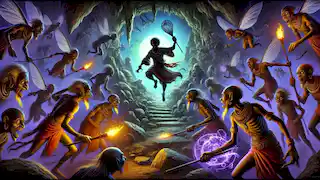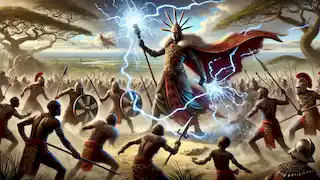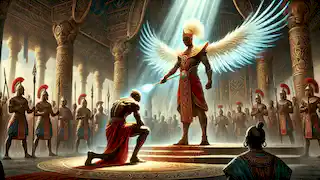The Epic of Mwindo
Reading time: 8 min

About this story: The Epic of Mwindo is a Myth from Congo set in the Ancient This Dramatic tale explores themes of Justice and is suitable for All Ages. It offers Moral insights. A miraculous child’s journey to become a wise and just leader.
The Epic of Mwindo, one of the great oral traditions of the Congo, is a tale filled with adventure, magic, heroism, and the struggles between mortals and divine forces. The story revolves around Mwindo, a miraculous child born to a cruel and power-hungry king named Shemwindo. As the prophecy foretells, Mwindo's birth will bring about the downfall of his father and change the fate of their people. His journey from an infant hero to a wise and powerful leader is filled with battles against gods, demons, and treacherous humans.
Introduction to the Kingdom of Tubondo
In the dense forests of the Congo, the small but mighty Kingdom of Tubondo thrived. It was ruled by the tyrant king Shemwindo, whose insatiable hunger for power was only matched by his fear of the unknown. He had seven wives, but his paranoia had led him to make a decree that none of his wives should bear him a son. He was terrified that a male heir might one day rise to overthrow him. So, when one of his wives became pregnant, his fury was unmatched.
However, as fate would have it, Shemwindo's seventh wife, Nyamwindo, bore him a son named Mwindo. Born under extraordinary circumstances, Mwindo did not cry like other babies, but spoke immediately after birth, announcing his destiny. He was born carrying a magical fly whisk, a symbol of his power and future greatness.
Shemwindo’s Wrath
Shemwindo, enraged by the birth of his son, sought to kill the child immediately. He had foretold that a son would bring chaos to his reign, so he commanded his soldiers to destroy Mwindo. They tried many methods—casting him into the river, sealing him in a drum, and burying him alive—but each time Mwindo miraculously survived. His magic and the protection of the gods ensured that he could not be easily defeated. Thus, Mwindo's journey began, not just as a boy surviving his father’s wrath, but as a hero destined to claim his rightful place.
Mwindo's first test of resilience was surviving his father's attempts on his life. Cast into a drum and thrown into the river, Mwindo called upon his magical powers to navigate the waters and reach the village of his maternal aunt, Iyangura.
The Journey Begins
Iyangura took Mwindo in, recognizing the special child he was. With her help and the assistance of various gods, Mwindo began his quest to confront Shemwindo and claim his rightful place. Along the way, Mwindo demonstrated his powers, growing rapidly from an infant to a young boy, wielding his magical fly whisk and an ax made from lightning.
As Mwindo prepared to confront his father, he gathered allies—both human and divine. Among them was Nkuba, the god of lightning, who gifted Mwindo with great strength and speed. Despite his divine gifts, Mwindo’s journey was not easy. Along the way, he faced numerous trials, battling monsters, spirits, and powerful enemies sent by his father to stop him. But Mwindo’s will was unshakable, and each obstacle only made him stronger.
The Underworld and the Quest for Justice
At the heart of Mwindo’s journey was his descent into the underworld, a place ruled by the dark god, Mukiti. Shemwindo, in desperation, sought help from Mukiti, hoping to imprison Mwindo in the realm of the dead. Yet, even the underworld could not contain the hero. Armed with his magical fly whisk, Mwindo fought Mukiti’s minions and freed the souls trapped there, including the spirits of many who had been wronged by Shemwindo.

During his time in the underworld, Mwindo’s leadership and compassion began to shine. He realized that his journey was not just about vengeance against his father, but about bringing balance to the world. With each victory, he liberated those oppressed by the tyranny of kings and gods alike. His wisdom grew, and he began to see that power should be used to protect the weak, not to dominate others.
Return to Tubondo
Having conquered the underworld and defeated Mukiti, Mwindo returned to the land of the living stronger than ever. He knew that the final battle with his father was near. Shemwindo, hearing of his son’s return, gathered his armies, believing that sheer force could crush the boy he had tried to kill. But Mwindo was no longer a child. With his powers and the loyalty of those he had freed, Mwindo faced his father in the ultimate confrontation.
In an epic battle that shook the very foundations of Tubondo, Mwindo’s forces clashed with Shemwindo’s armies. The sky darkened with the magic of gods and men, and the earth trembled beneath their feet. Mwindo, wielding his lightning ax and fly whisk, fought not just with strength but with the wisdom he had gained on his journey. He knew that to truly win, he could not simply kill his father—he had to change the hearts of his people and lead them to a better future.
The Defeat of Shemwindo
In the heat of battle, Mwindo confronted his father. But rather than strike him down, Mwindo used his powers to humble Shemwindo. He stripped him of his crown and his pride, showing him that true power came not from domination, but from compassion and justice.
Shemwindo, defeated both physically and morally, begged for forgiveness. Mwindo, now a wise and just leader, granted it, but exiled his father from Tubondo forever. Shemwindo’s reign of terror was over, and Mwindo ascended to the throne. Under his leadership, Tubondo flourished, and peace was restored to the kingdom.

Mwindo’s rule was marked by fairness and wisdom. He rebuilt the kingdom, ensuring that his people were cared for and that justice prevailed. He established laws that protected the weak and made sure that no one, not even the king, was above the law. His journey from a miraculous child to a wise king became the stuff of legend, passed down through generations.
The Lessons of Mwindo
The Epic of Mwindo is not just a tale of adventure and magic. It is a story about leadership, justice, and the responsibility that comes with power. Mwindo’s journey teaches us that true strength comes not from the ability to conquer others, but from the wisdom to lead with compassion and fairness.
Through his trials, Mwindo learned that vengeance alone cannot bring peace. It is only through understanding, forgiveness, and the pursuit of justice that a true leader can create lasting change. In the end, Mwindo did not just defeat his enemies—he transformed them. And in doing so, he transformed his kingdom and became a legend that would inspire generations to come.
Mwindo’s Legacy
Mwindo’s reign lasted many years, and under his leadership, Tubondo became a beacon of peace and prosperity in the Congo. The gods who had once tested him now respected him, and the people who had once feared his father now loved their wise and just king. Mwindo’s story became a symbol of hope, showing that even in the darkest of times, a hero could rise to bring light.

Generations after Mwindo, storytellers continued to pass down his tale, ensuring that his legacy would never be forgotten. His journey from a miraculous child, cast into the river by a fearful father, to a wise and compassionate king, serves as a reminder that greatness is not something we are born with—it is something we earn through courage, wisdom, and compassion.
In the Kingdom of Tubondo, Mwindo’s name became synonymous with justice. Children grew up hearing his story, and leaders aspired to rule with the same fairness and strength that he had shown. The Epic of Mwindo, rich in adventure and filled with powerful lessons, remains one of the most enduring tales from the heart of Africa, a testament to the timeless values of courage, leadership, and justice.
Conclusion: The Hero’s Return
Mwindo’s story did not end with his reign. As he grew older, he knew that his time as king would eventually come to an end, but he had prepared his people well. He left behind a legacy of peace, a kingdom built on the principles of justice and compassion. When Mwindo finally departed the mortal world, some say that he did not die, but ascended to the heavens, where he continues to watch over his people, guiding them from the stars.

The story of Mwindo is a powerful reminder that even the smallest of us can rise to greatness, that justice and compassion are stronger than fear and tyranny, and that true leadership comes from the heart. Mwindo’s journey may have begun with a prophecy, but it was his courage, wisdom, and determination that truly made him a hero.


















